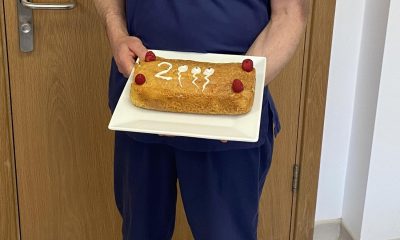Dracula was onto something as young blood really could stop you from getting old, scientists claim.
Transfusions of serum may hold the key to preventing age-related diseases - including Alzheimer's.
It is a portion of plasma that remains after the formation of clots.
In experiments, giving mice the proteins taken from youthful peers and injected into elderly rodents turned back the clock on muscle cells.
via GIPHY
Senior author Professor Fabrisia Ambrosio, of Pittsburgh University, said: "We're really excited about this research for a couple of reasons.
"In one way, it helps us understand the basic biology of how muscle regeneration works and how it fails to work as we age.
"Then, taking that information to the next step, we can think about using extracellular vesicles as therapeutics to counteract these age-related defects."
The study in Nature Aging sheds fresh light on the development of frailty - and how to combat it.
It sees older people feeling unnecessarily low in energy and suffering weight loss and weakness.
They are more prone to falls, fractures, hospitalization, disability, dementia - and even premature death.
Avoiding the condition increases the chances of maintaining independence and lessens the likelihood of needing to be placed in care.
It's also associated with a lower quality of life and depression.
As we age our muscles gradually become smaller - and less able to heal after injury. The findings could lead to regeneration therapies.
It found 'circulating shuttles' called EVs (extracellular vesicles) deliver genetic instructions to a longevity protein known as Klotho.
The US team discovered old mice had fewer than their younger counterparts. and this may hold the key to why muscle power dwindles with age.
The study builds on decades of research on mice showing young blood restores youthful features to cells and tissues.
Now the mechanism behind the rejuvenating effects has finally been identified.
Lead author Dr. Amrita Sahu, also from Pittsburgh, said: "We wondered if extracellular vesicles might contribute to muscle regeneration because these couriers travel between cells via the blood and other bodily fluids.
"Like a message in a bottle, EVs deliver information to target cells.”
The researchers collected serum from young mice. When it was injected into aged mice, injured muscles regenerated and recovered function.
Those that received a placebo treatment remained frail.
But the serum’s restorative properties were lost when EVs were removed - indicating they mediate the beneficial effects of young blood.
Further analysis found they deliver genetic instructions - or mRNA (messenger ribonucleic acid).
It carries genetic code from DNA encoding the anti-aging protein Klotho to muscle progenitor cells - stem cells that boost skeletal muscle.
EVs collected from old mice carried fewer copies of the instructions for Klotho than those from young mice - prompting less of the protein.
With increasing age, muscle doesn’t heal as well after damage. Scar tissue is deposited instead of restoring the original muscle structure.
Earlier work by the same researchers showed Klotho regulates regenerative capacity in muscle progenitor cells - and declines with age.
It opens the door to developing EVs into novel therapies for healing damaged muscle tissue.
Ambrosio said: "EVs may be beneficial for boosting the regenerative capacity of muscle in older individuals and improving functional recovery after an injury.
"One of the ideas we're really excited about is engineering EVs with specific cargoes - so we can dictate the responses of target cells."
Beyond muscles, EVs could also help reverse other effects of aging. Previous work has demonstrated that young blood can boost the cognitive performance of aged mice.
The researchers have a grant to explore the potential of EVs for reversing age-related declines in cognition.
Clinics offering blood transfusions have cropped up all over the world after a number of studies have suggested they could reverse aging.
The Food and Drug Administration in the US has warned there is no evidence the therapy works.
In Dracula, written in 1897, Bram Stoker's famous vampire stayed young by drinking the blood of mortals.

 Parenting1 week ago
Parenting1 week ago
 Lifestyle6 days ago
Lifestyle6 days ago
 Good News3 days ago
Good News3 days ago
 Wildlife2 days ago
Wildlife2 days ago
 Health3 days ago
Health3 days ago
 Broadcast1 week ago
Broadcast1 week ago
 Environment1 week ago
Environment1 week ago
 Work1 day ago
Work1 day ago





















